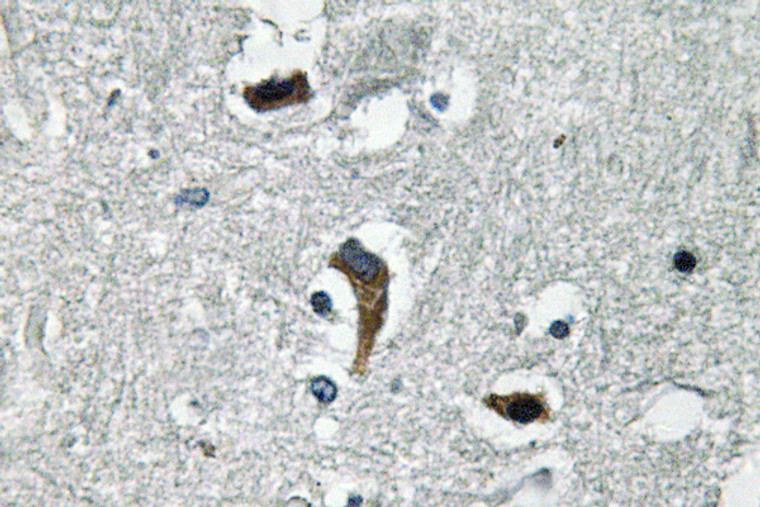| Host: |
Rabbit |
| Applications: |
WB/IHC/IF/ELISA |
| Reactivity: |
Human/Mouse/Rat |
| Note: |
STRICTLY FOR FURTHER SCIENTIFIC RESEARCH USE ONLY (RUO). MUST NOT TO BE USED IN DIAGNOSTIC OR THERAPEUTIC APPLICATIONS. |
| Short Description: |
Rabbit polyclonal antibody anti-Calcium-activated potassium channel subunit beta-4beta-4 (70-119 aa) is suitable for use in Western Blot, Immunohistochemistry, Immunofluorescence and ELISA research applications. |
| Clonality: |
Polyclonal |
| Conjugation: |
Unconjugated |
| Isotype: |
IgG |
| Formulation: |
Liquid in PBS containing 50% Glycerol, 0.5% BSA and 0.02% Sodium Azide. |
| Purification: |
The antibody was affinity-purified from rabbit antiserum by affinity-chromatography using epitope-specific immunogen. |
| Concentration: |
1 mg/mL |
| Dilution Range: |
WB 1:500-1:2000IHC 1:100-1:300ELISA 1:20000IF 1:50-200 |
| Storage Instruction: |
Store at-20°C for up to 1 year from the date of receipt, and avoid repeat freeze-thaw cycles. |
| Gene Symbol: |
KCNMB4 |
| Gene ID: |
27345 |
| Uniprot ID: |
KCMB4_HUMAN |
| Immunogen Region: |
70-119 aa |
| Specificity: |
MaxiK Beta Polyclonal Antibody detects endogenous levels of MaxiK Beta protein. |
| Immunogen: |
The antiserum was produced against synthesized peptide derived from the human MaxiKbeta at the amino acid range 70-119 |
| Post Translational Modifications | Phosphorylated. Phosphorylation modulates its effect on KCNMA1 activation kinetics. N-glycosylated. A highly glycosylated form is promoted by KCNMA1. Glycosylation, which is not required for the interaction with KCNMA1 and subcellular location, increases protection against charybdotoxin. |
| Function | Regulatory subunit of the calcium activated potassium KCNMA1 (maxiK) channel. Modulates the calcium sensitivity and gating kinetics of KCNMA1, thereby contributing to KCNMA1 channel diversity. Decreases the gating kinetics and calcium sensitivity of the KCNMA1 channel, but with fast deactivation kinetics. May decrease KCNMA1 channel openings at low calcium concentrations but increases channel openings at high calcium concentrations. Makes KCNMA1 channel resistant to 100 nM charybdotoxin (CTX) toxin concentrations. |
| Protein Name | Calcium-Activated Potassium Channel Subunit Beta-4Bk Channel Subunit Beta-4Bkbeta4Hbeta4Calcium-Activated Potassium Channel - Subfamily M Subunit Beta-4Charybdotoxin Receptor Subunit Beta-4K(Vcabeta-4Maxi K Channel Subunit Beta-4Slo-Beta-4 |
| Database Links | Reactome: R-HSA-1296052Reactome: R-HSA-418457 |
| Cellular Localisation | MembraneMulti-Pass Membrane Protein |
| Alternative Antibody Names | Anti-Calcium-Activated Potassium Channel Subunit Beta-4 antibodyAnti-Bk Channel Subunit Beta-4 antibodyAnti-Bkbeta4 antibodyAnti-Hbeta4 antibodyAnti-Calcium-Activated Potassium Channel - Subfamily M Subunit Beta-4 antibodyAnti-Charybdotoxin Receptor Subunit Beta-4 antibodyAnti-K(Vcabeta-4 antibodyAnti-Maxi K Channel Subunit Beta-4 antibodyAnti-Slo-Beta-4 antibodyAnti-KCNMB4 antibody |
Information sourced from Uniprot.org
12 months for antibodies. 6 months for ELISA Kits. Please see website T&Cs for further guidance









